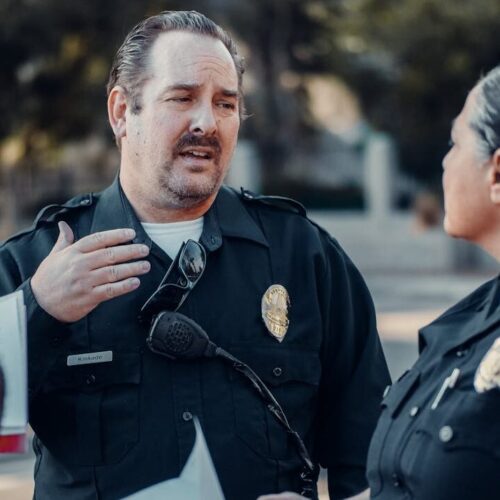
Federal Agencies Convene Law Enforcement and Behavioral Health Leaders to Discuss Shared Opportunity of 988
Community leaders around the country have heralded the arrival of 988—the 3-digit code for people to reach the National Suicide & Crisis Lifeline—as an essential new resource to shift people in crisis toward appropriate care. However, important design and operational questions are emerging about how new 988 processes will interface with existing law enforcement and crisis responses, including: How should behavioral health-related calls be triaged by 911 and correctly routed to 988, and vice versa? If a response is needed, how can leaders ensure it is timely and appropriate? What steps are needed to establish trust in the new dialing code?
Reflecting the importance of addressing these questions collaboratively, the U.S. Department of Justice’s Office of Justice Programs’ Bureau of Justice Assistance (BJA) and the Substance Abuse and Mental Health Services Administration (SAMHSA) are working with The Council of State Governments (CSG) Justice Center to articulate a vision for law enforcement’s role in 988. Together, they are also helping to develop strategies to support jurisdictions as they integrate 988 into their public health and safety systems. This work kicked off in January 2023 with a National Forecasting Group Meeting in Washington, D.C., which brought together representatives from state and local jurisdictions, including Law Enforcement-Mental Health Learning Sites and Justice and Mental Health Collaboration Program (JMHCP) grantees, national law enforcement groups, federal leaders, and criminal justice, behavioral health, and community partners to begin this conversation and identify areas where federal support and guidance is needed.
Throughout the day, law enforcement and behavioral health leaders agreed that 988 has the potential to be a powerful tool for behavioral health diversion, increasing opportunities to connect callers with needed health-first services when appropriate. Building on that objective, three major themes emerged about how to actualize this shared vision.
1. A continued commitment from federal agencies is critical to the success of 988 nationwide.
Federal agencies have long played an important role in setting best practice standards for the field and encouraging cross-system collaboration among behavioral health and criminal justice systems. Now, as public safety, crisis, and health partners at every level of government are coming together to codesign and integrate the various elements of their crisis systems, many expressed a need for funding and guidance from the federal government to build the infrastructure for lasting, systems-level collaborations.
“As a long-time Law Enforcement-Mental Health Learning Site, we’ve heard from several law enforcement agencies that their communities had very little in terms of crisis services for years,” said Sgt. Jason Winsky from Tucson, Arizona Police Department. “Now, we’re hearing that many have crisis stabilization services, but they aren’t working; police can’t take people there if they’re too agitated or too drunk. Often, these communities were tasked with implementing crisis stabilization and receiving services quickly with little guidance. They would benefit from a toolkit or best practice guide, so they don’t have to work backward to implement low barrier services after the fact.”
As the work of transitioning communities to 988 increasingly bridges law enforcement and behavioral health systems, policymakers at the local, state, and federal levels will also need to align planning and funding to reduce duplication and bridge funding gaps. Amy Solomon, principal deputy assistant attorney general at the Office of Justice Programs said during the meeting that the federal government is committed to the success of 988. “We know law enforcement has an important role in 988 implementation,” she said. “As your federal partners, we want to work together with you, the practitioners leading this work in communities across the country, to articulate a vision for what law enforcement’s role should be and how we can support it over the coming years.”
2. Meaningful cross-system collaboration requires trust among partners and a shared understanding across systems.
Many attendees highlighted the importance of bridging organizational and professional cultures in order to effectively advance comprehensive crisis systems. “We took to heart participants’ comments about the need to understand one another’s culture and language as we break down silos to advance this work,” said Monica Johnson, director of the 988 Behavioral Health Crisis Coordinating Office at SAMHSA. “That we’re all here, in the same room, working through this together with humility and intentionality, is a huge step in this direction.” Participants discussed the need for establishing shared language and a deepened understanding of the goals and needs of each partner, especially between law enforcement, 911, and behavioral health systems. Recommendations included increased training and technical assistance to support the creation of a shared language using common definitions and guidance for both behavioral health and law enforcement leaders on promising strategies to bridge these cultural divides.
3. Equity and access are central to a shared vision of 988.
Too often, when jurisdictions have built systems of care in the U.S., they have not been designed to effectively serve everyone in the community, including historically marginalized groups, such as people of color, people with disabilities, youth and young adults, and people living in poverty. The Center for Disease Control and Prevention recently reported that young people are facing unprecedented levels of sadness, suicidality, and violence, with 3 in 5 teen girls reporting feeling “persistently sad or hopeless,” up 60 percent from a decade ago. Suicide is also rising at disproportionate rates, particularly among Native People (up 26 percent in 2021 from 2018) and Black people (up 19.2 percent), especially those aged 10 to 24.
However, as many participants noted, if people do not trust 988 because they do not believe it is designed to serve their needs, they will not use it. Instead, they will continue to default to emergency services such as 911 as their crisis progresses, or worse, not call for help until it is too late. Both of these circumstances result in ongoing overreliance on law enforcement and emergency hospitalization. “This, like every other system, will never reach maximum potential until we begin to own and address its inequities—if we aren’t equitably committed to everyone, the system will not progress.” said Dr. Rochelle Head-Dunham, executive director and medical director of Metropolitan Human Services District in New Orleans, Louisiana.
Insights gained from the forecaster meeting will inform an upcoming roadmap, which will include a suite of training, technical assistance, and policy resources responsive to the crisis needs defined by the people leading efforts across the country. “This meeting helped us initially sketch out what is needed to achieve a vision for 988 that centers each caller’s dignity and ensures they get the care they need while reducing the burden on law enforcement to respond to health needs,” said Dr. Ayesha Delany-Brumsey, Behavioral Health division director at the CSG Justice Center. “We each have a piece of this problem, so it’s up to us all to work together to determine how we move forward.”
Learn more about the role of law enforcement and other criminal justice stakeholders at 988: A Shared Opportunity.
About the author

In response to growing calls for police reform in New Jersey, particularly following the shootings of Najee Seabrooks…
Read MoreThe sharp rise in school shootings over the past 25 years has led school officials across the U.S.…
Read More Three Things to Know About New Jersey’s Groundbreaking Community Response Legislation
Three Things to Know About New Jersey’s Groundbreaking Community Response Legislation
In response to growing calls for police reform in New Jersey, particularly…
Read More Taking the HEAT Out of Campus Crises: A Proactive Approach to College Safety
Taking the HEAT Out of Campus Crises: A Proactive Approach to College Safety
The sharp rise in school shootings over the past 25 years has…
Read More From 911 to 988: Salt Lake City’s Innovative Dispatch Diversion Program Gives More Crisis Options
From 911 to 988: Salt Lake City’s Innovative Dispatch Diversion Program Gives More Crisis Options
A three-digit crisis line, 988, launched two years ago to supplement—not necessarily…
Read More Matching Care to Need: 5 Facts on How to Improve Behavioral Health Crisis Response
Matching Care to Need: 5 Facts on How to Improve Behavioral Health Crisis Response
It would hardly be controversial to expect an ambulance to arrive if…
Read More











